Introduction
In a world where health and wellness have become paramount, the pursuit of a healthier lifestyle often leads individuals to confront the challenge of belly fat. Understanding the multifaceted approach to combating this common concern is essential for fostering lasting change. From embracing whole foods and effective exercise routines to recognizing the impact of lifestyle factors and hormonal changes, each element plays a crucial role in achieving personal health goals.
This article delves into practical strategies and empowering insights that not only support weight management but also promote overall well-being, encouraging individuals to take charge of their health journeys with confidence and determination.
Essential Dietary Changes for Reducing Belly Fat
To effectively combat belly fat, it’s essential for women with bellies to prioritize whole foods and limit processed options. Embrace these transformative dietary changes:
-
Increase Fiber Intake: Incorporating fiber-rich foods such as fruits, vegetables, legumes, and whole grains is crucial.
These foods not only enhance satiety but also assist in regulating digestion, making it easier to sustain a healthy body. Recent studies indicate a strong link between high fiber intake and successful results in reducing body mass, providing the necessary motivation to make this adjustment. -
Choose Healthy Fats: Opt for healthy fat sources like avocados, nuts, and olive oil, which support metabolic health.
Avoid trans fats commonly found in processed foods. Such dietary fats can aid in fat reduction, particularly in the abdominal area, which is significant for overall well-being. -
Limit Sugary Beverages: Replace sodas and sugary drinks with healthier alternatives like water, herbal teas, or infused water.
This switch not only decreases empty calorie consumption but also promotes improved hydration, a key element in any journey to achieve a healthier body. -
Eat Protein-Rich Foods: Incorporate lean meats, fish, eggs, and plant-based proteins into your diet.
Protein is crucial for preserving muscle mass while losing fat, which is important for sustainable management of body composition. As indicated by nutrition specialists, the correct balance of macronutrients, especially protein, can greatly affect success in reducing mass. -
Control Portion Sizes: Mindful portion control is critical, even when consuming healthy foods.
Using smaller plates can effectively help in controlling portion sizes, minimizing the risk of overeating.
By embracing these dietary adjustments, not only can individuals improve their physical health, but women with bellies can also cultivate a positive body image and overall well-being, reinforcing the significance of nutrition in achieving personal health objectives. Real-life success stories from women with bellies who embraced whole foods and experienced significant reductions in belly fat serve as powerful reminders of the potential for transformation through mindful eating.
Additionally, a study named 'Results of Reducing Body Mass by Gender' showed that female participants in the reduction group shed an average of 3.17 kg, whereas male participants shed an average of 4.06 kg, emphasizing the efficacy of dietary modifications. This corresponds with the conclusions of Professor Manabu T. Nakamura, who indicated, 'The strong correlation implies that participants who were able to establish sustainable dietary modifications within the first three months continued to lose pounds in the following months, whereas those who struggled to adopt sustainable dietary habits early on seldom succeeded in altering their diet in the later months.'
Additionally, self-reported body weight changes categorized participants into weight loss, weight neutral, and weight gain groups, providing a broader context for the effectiveness of the dietary changes discussed.
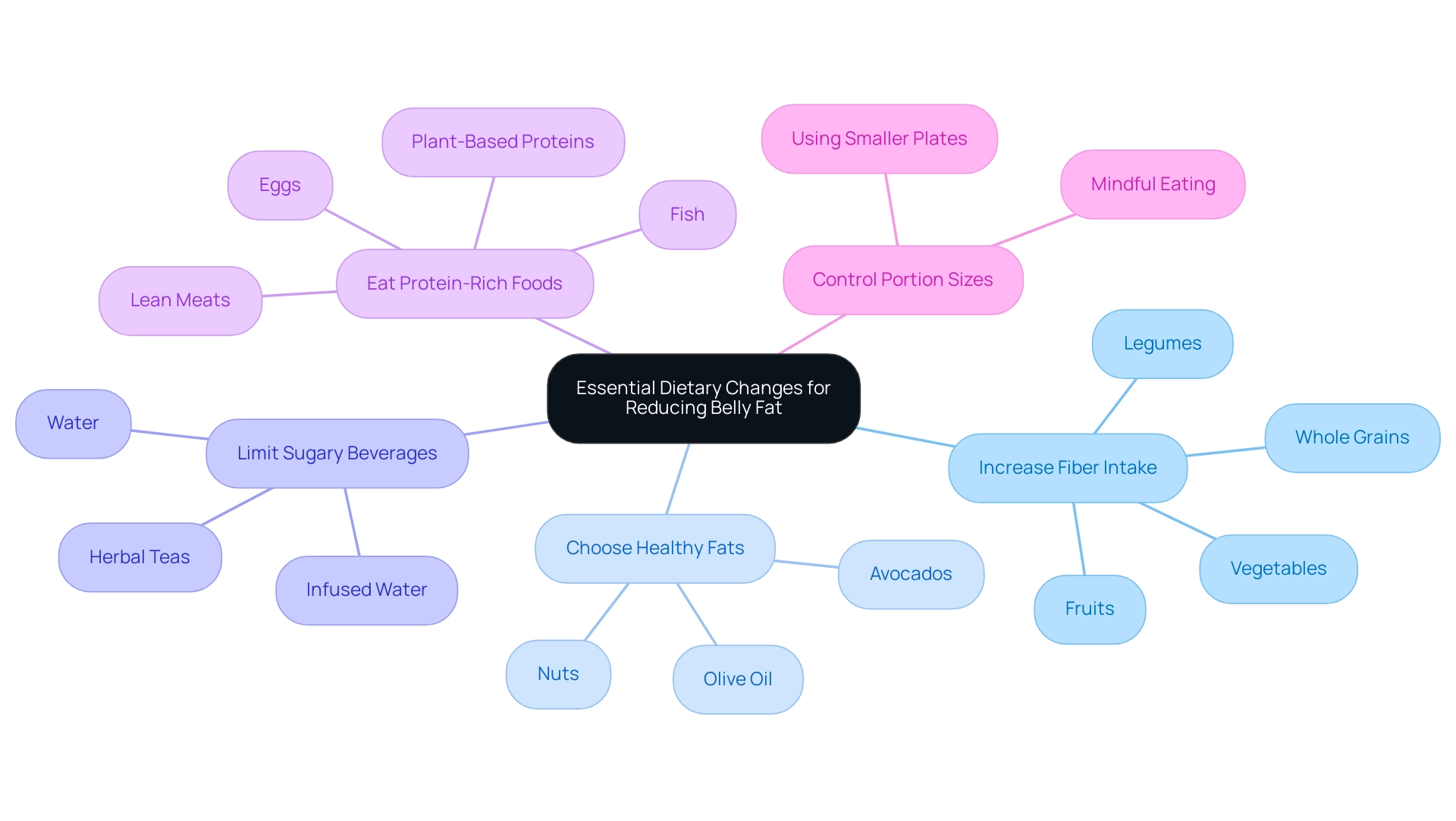
Incorporating Effective Exercise Routines to Combat Belly Fat
To effectively combat belly fat and foster a healthier lifestyle, consider implementing these empowering exercise routines, supported by our comprehensive wellness coaching app, which offers all the tools and resources you need in one place for your health journey:
- Cardiovascular Exercise: Aim to engage in activities such as brisk walking, jogging, cycling, or swimming for at least 150 minutes each week. This not only aids in burning calories but also significantly enhances heart health, a core focus of our app's personalized programming.
- Strength Training: Incorporate strength training routines at least twice a week, focusing on major muscle groups. Whether it’s bodyweight movements, resistance bands, or weights, developing muscle is essential as it boosts metabolism and assists in fat reduction. Our app provides tailored strength workouts to suit your team's individual needs, utilizing evidence-based techniques from experienced coaches.
- High-Intensity Interval Training (HIIT): Short bursts of intense activity followed by rest are particularly effective for fat loss. Incorporating HIIT workouts into your routine 1-2 times a week can yield impressive results, with sessions ideally lasting 20–30 minutes, as recommended. Our app features guided HIIT sessions to keep users motivated.
- Core Strengthening Activities: Incorporate movements that specifically target the core—such as planks, bridges, and bicycles—to tone abdominal muscles and enhance stability. Access personalized coaching and video demonstrations through our app to ensure proper techniques.
- Consistency is Key: A varied workout regimen keeps your routine engaging and effective. Strive for a mix of various forms of physical activity throughout the week to maintain motivation and achieve lasting results, supported by daily programming from our coaching app.
As highlighted by Carla E. Cox in her study, 'When loss of mass is accomplished through any reduction program, does physical activity aid in the preservation of that loss?' This emphasizes the crucial connection between physical activity and maintaining body mass. Furthermore, a case study named 'Promoting Physical Activity in Clinical Practice' shows that despite the advantages of physical activity, many patients find it challenging to participate in regular movement, with only 30% receiving counseling on physical activity from healthcare providers.
Participating regularly in these fitness routines, along with the tailored assistance of our wellness coaching app, can aid women with bellies in losing pounds while also enhancing their overall health and confidence. As one of our users, Sarah, shared, "This app has transformed my approach to fitness; having everything I need in one place makes it so much easier to stay on track!
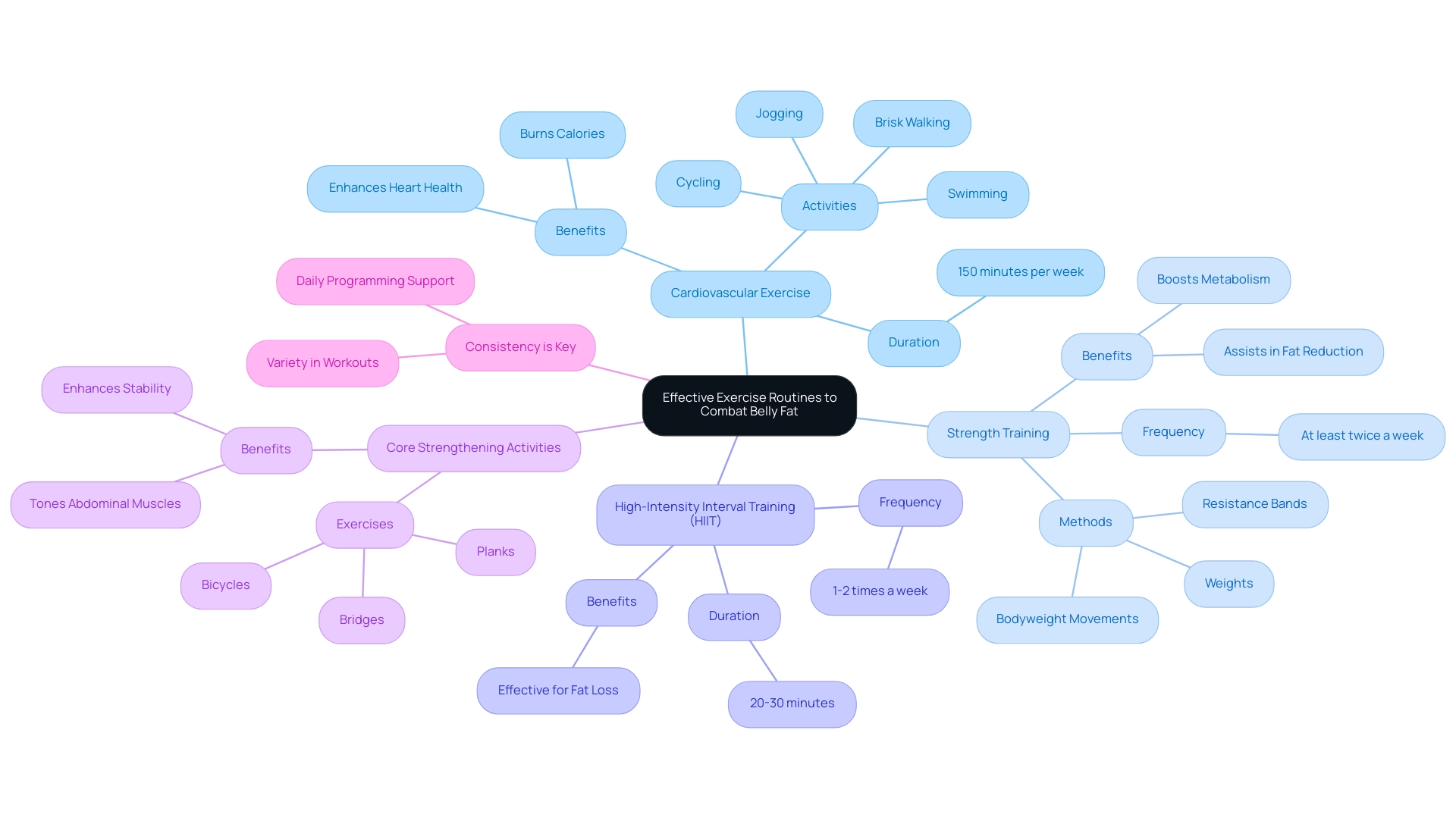
Understanding Lifestyle Factors That Contribute to Belly Fat
Several lifestyle factors significantly contribute to the accumulation of belly fat, and understanding these can empower you to make impactful changes:
- Stress Management: Chronic stress is a major contributor to overeating and subsequent increase in mass. Implementing stress-reduction techniques such as mindfulness, yoga, or deep breathing exercises can be transformative. According to Dr. Charlie Seltzer, a physician specializing in reduction,
Stress-related gain can only be diagnosed by taking a careful history and ruling out other factors, highlighting the complex relationship between stress and body mass. Importantly, lifestyle changes and medical treatments can assist in lowering stress levels and decreasing stress-related gain. - Quality Sleep: Prioritize 7-9 hours of quality sleep each night. Inadequate sleep disturbs hormones that control appetite, which can result in increased gain. Recent findings highlight the essential role sleep plays in managing body mass effectively.
- Hydration: Staying well-hydrated helps control hunger and prevent overeating. Aim to drink at least 8 cups of water daily to support your body's needs.
- Limit Alcohol Consumption: Excessive alcohol intake is associated with an increase in mass, particularly around the abdomen in women with bellies. Moderation is crucial for sustaining a healthy physique.
- Regular Meal Timing: Establishing a consistent eating schedule regulates hunger and curtails impulsive snacking. This structured approach can foster healthier eating habits.
These lifestyle modifications are more than just personal choices; they are crucial strategies for addressing the psychosocial stressors that contribute to gaining. A longitudinal study titled "Psychosocial Stress and Weight Gain" followed US adults over 9 years, revealing that psychosocial stress was linked to greater increases in mass, particularly in individuals with higher baseline BMI, facing job demands, financial difficulties, and mental health issues. Furthermore, the alteration in body mass index was noted to be 1.57 kg for women and 1.37 kg for men, underlining the significant impact of these factors.
By focusing on these elements, you can lead the charge in fostering a healthier, more resilient workplace.
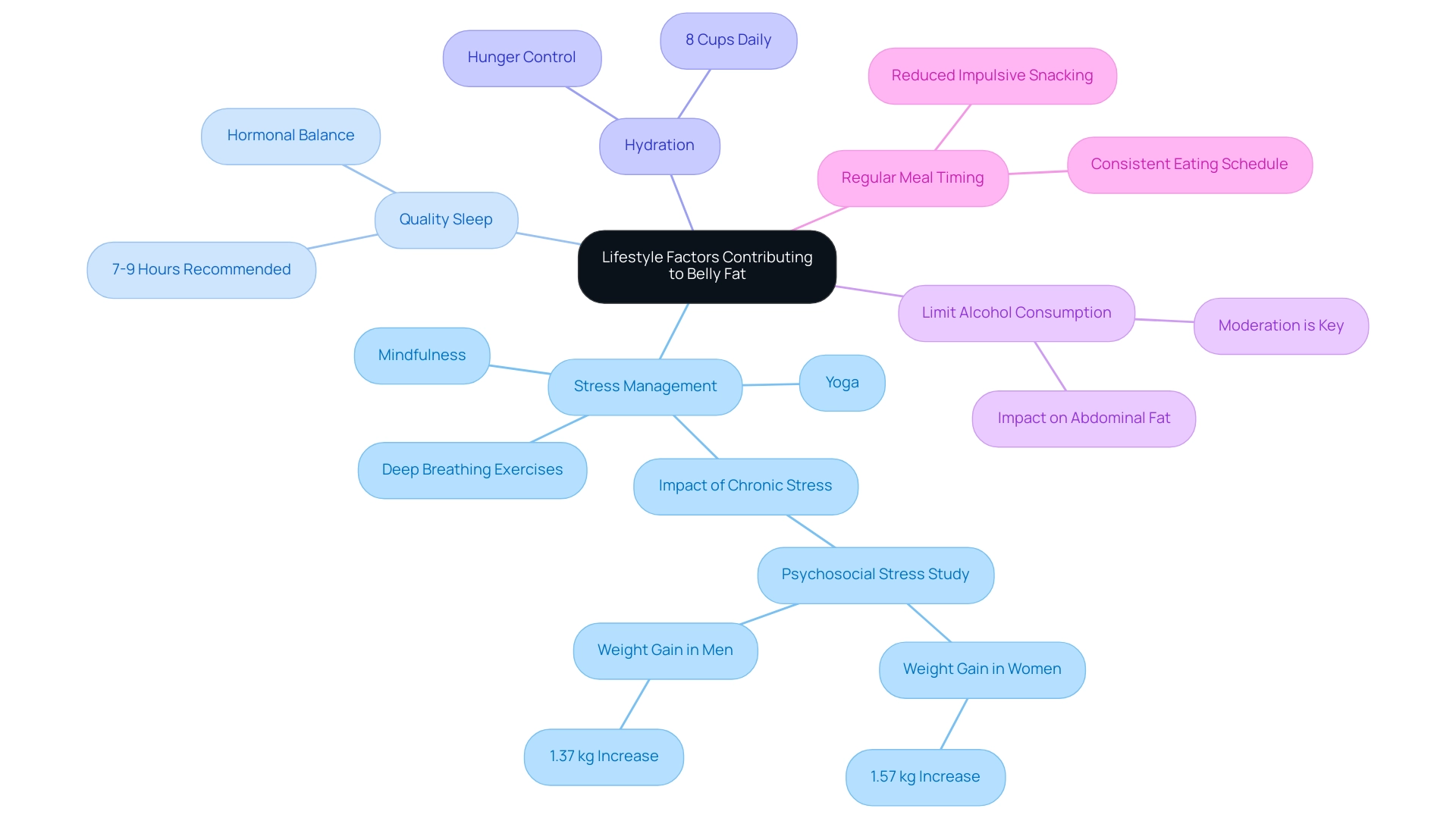
Navigating Hormonal Changes and Their Impact on Belly Fat
Hormonal changes during menopause can significantly influence body mass, particularly belly fat, in several important ways:
-
Menopause and Increased Mass: As women transition into menopause, hormonal fluctuations often lead to an increase in mass. Recognizing this shift is crucial for adjusting dietary and exercise strategies effectively. A recent prospective study highlighted that many women aged 42-50 experienced weight increases, with some gaining over 4.5 kg, showcasing the variability in weight fluctuations, which ranged from a 14.8 kg loss to a 32.4 kg gain. At Foresight Health Coaching, we offer customized programs that assist women in managing these transitions through personalized fitness coaching and nutritional guidance.
Insulin Sensitivity: These hormonal adjustments can also influence how the body processes insulin, which may lead to increased fat storage, particularly around the abdomen. Maintaining a balanced diet is essential for stabilizing blood sugar levels and managing insulin sensitivity, a key factor in preventing excess fat accumulation. Our wellness programs focus on creating effective dietary strategies that empower women to manage these shifts confidently.
-
Seek Professional Guidance: It’s essential to consult healthcare experts, such as nutritionists or endocrinologists, for personalized strategies to address hormonal fluctuations and their effect on body mass. As Dr. Jennifer Franceschelli Hosterman advises,
Instead of worrying, or worse yet, delaying treatment for something abnormal, talk with your doctor.
This proactive approach, complemented by our coaching services, can lead to more effective management of weight-related concerns.
-
Embrace a Holistic Approach: Integrating stress management, exercise, and dietary adjustments into a unified strategy can counteract the effects of hormonal changes on body composition. At Foresight Health Coaching, we highlight a thorough wellness strategy that assists women in improving their overall health while managing their condition during this transitional phase.
Stay Informed: Empower yourself with knowledge about hormonal health and its impact on body composition. Being informed enables you to make educated decisions regarding your health and well-being, establishing a foundation for sustainable management. Effective interventions aimed at reducing body mass in postmenopausal women have demonstrated success in enhancing not only body composition but also overall health results, including insulin sensitivity and cardio-respiratory fitness, without compromising lean mass. Structured programs are essential for maintaining the outcomes of successful gain prevention interventions in mid-age women, and Foresight Health Coaching is here to support you every step of the way.
Additionally, our corporate membership offerings include comprehensive wellness programs tailored for organizations, covering up to 30 employees. These memberships provide in-person wellness talks, nutrition services, and access to our health and wellness app, which facilitates ongoing support and community engagement among clients. This app-based delivery enhances the personalized coaching experience, making it easier for participants to track their progress and stay connected with their wellness goals.
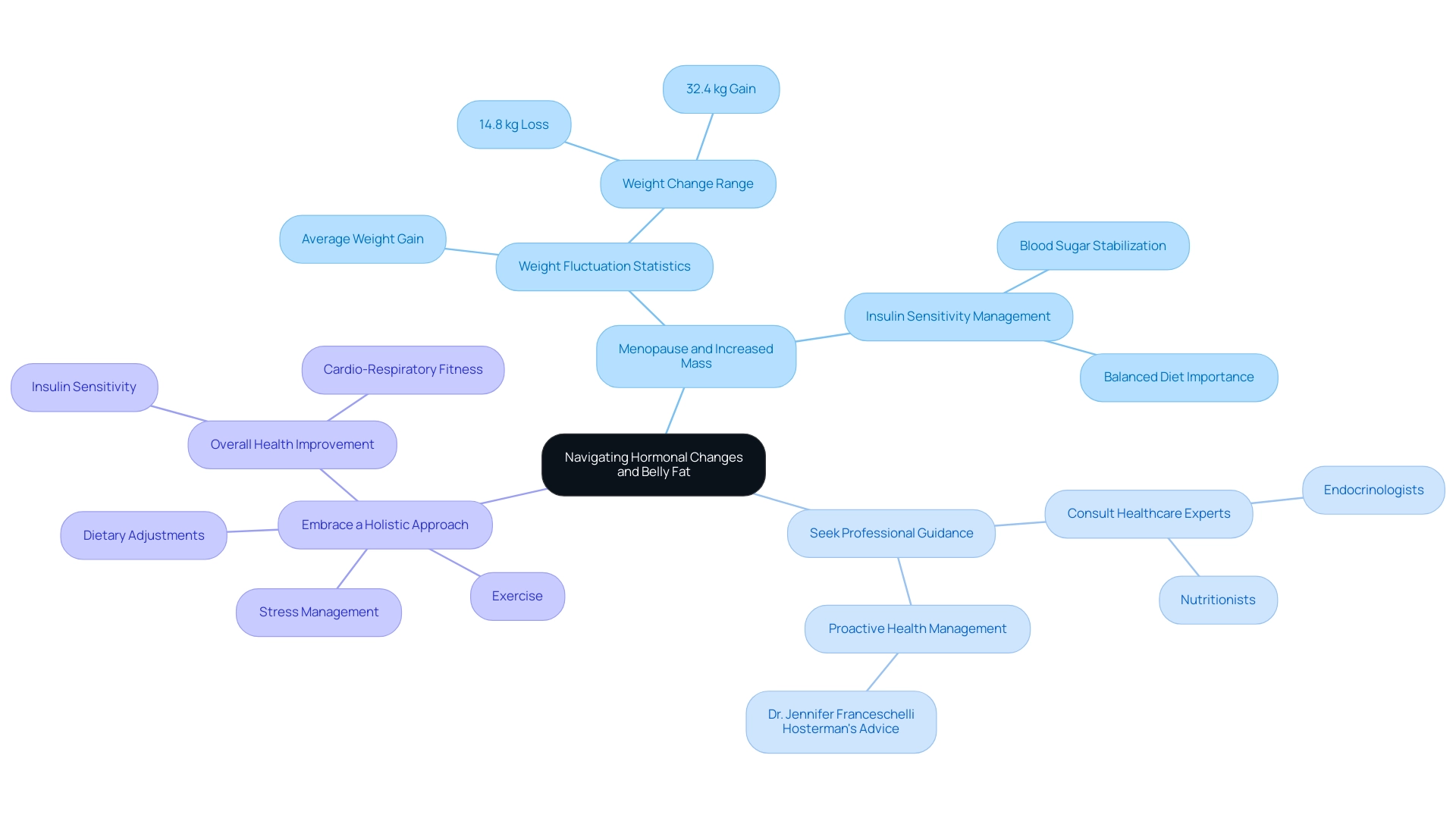
Practical Strategies for Women to Reduce Belly Fat
Empowering women with bellies to manage and reduce their belly fat requires a thoughtful approach that embraces body positivity and realistic expectations. Here are some practical strategies that can make a significant difference:
- Set Realistic Goals: Establishing attainable objectives for reducing body mass is paramount. Rather than striving for significant adjustments, concentrate on a consistent reduction of 1-2 pounds each week. Research shows that individuals who set multiple, smaller goals often experience greater success; specifically, those who set four or more targets tend to achieve better results. A case study titled "Setting Targets in Weight Management" highlights that individuals who set weight-loss targets experienced significantly greater weight loss, reinforcing the effectiveness of this strategy.
- Meal Prep: Preparing meals in advance is a game-changer for maintaining healthy eating habits. By planning nutritious meals ahead of time, you can avoid the temptation of unhealthy choices when life gets hectic. Success stories abound of individuals who have transformed their eating habits through effective meal prep. Additionally, focusing on nutrition is crucial, as a significant percentage of Gen X women with bellies (40%) are currently emphasizing dieting alone, which underscores the need for a more balanced approach. Our Foresight Health Coaching app includes meal planning features that can help streamline this process, making it easier to stay on track.
- Stay Active Throughout the Day: Incorporate more movement into your daily routine. Simple changes, such as taking the stairs instead of the elevator or engaging in active hobbies, can significantly contribute to overall health. Remember, every little bit counts!
- Track Your Progress: Keeping a journal of your food intake, exercise routines, and emotional states can reveal patterns that help you stay accountable. This practice not only fosters awareness but also empowers you to make informed decisions about your health journey. It's essential to remember that weight regain can be high, with statistics indicating that 80% of individuals experience weight regain after five years, emphasizing the importance of sustainable practices. The app allows you to easily log your meals and workouts, providing insights that can guide your journey.
- Seek Support: Surround yourself with encouraging friends or join a community focused on health and wellness. Sharing experiences and motivation can enhance your journey and create a supportive environment that celebrates body positivity.
Additionally, to further support your journey towards promoting wellness among your team, consider signing up for our free 7-day trial of the Foresight Health Coaching app. Experience firsthand how our program can empower your team to thrive in their health and wellness goals. With features designed to assist with meal prep and progress tracking, our app is a valuable resource that aligns with the strategies outlined above.
Embrace the transformative power of our app and kickstart a healthier lifestyle today!
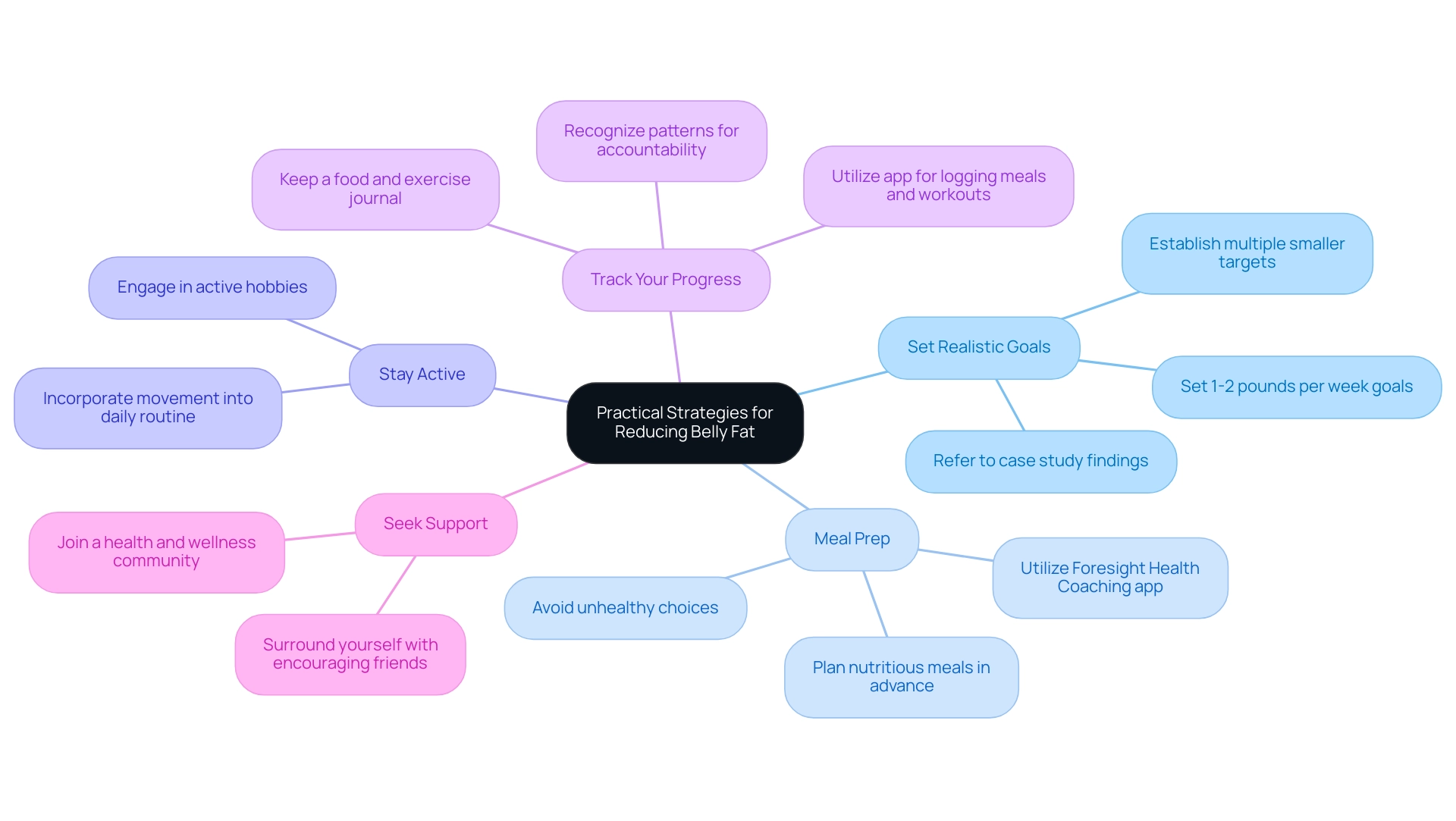
Conclusion
Making meaningful changes to reduce belly fat involves a comprehensive approach that encompasses dietary adjustments, exercise routines, and lifestyle modifications. Prioritizing whole foods, increasing fiber intake, and being mindful of portion sizes are crucial dietary strategies that foster satiety and promote a positive body image. Embracing healthy fats and limiting sugary beverages further enhances nutritional choices, creating a strong foundation for successful weight management.
Incorporating effective exercise routines, such as cardiovascular workouts and strength training, not only aids in burning calories but also builds muscle, which is essential for boosting metabolism. High-Intensity Interval Training (HIIT) and core-strengthening exercises can accelerate fat loss while ensuring a balanced and engaging fitness regimen. Consistency is key, and utilizing tools like wellness coaching apps can provide the necessary support to maintain motivation and track progress.
Understanding the impact of lifestyle factors—including stress management, quality sleep, and hydration—can empower individuals to make impactful changes. Recognizing how hormonal fluctuations during menopause affect weight can also guide women in navigating this transitional phase with informed strategies and professional support.
Ultimately, the journey towards reducing belly fat is not just about physical changes; it’s about fostering overall well-being and building a healthier lifestyle. By setting realistic goals, meal prepping, staying active, and seeking support, individuals can create a sustainable path to success. Embracing this holistic approach will lead not only to a reduction in belly fat but also to a more confident and empowered self. Taking the first step today can pave the way for lasting transformation and improved health for both individuals and their teams.




